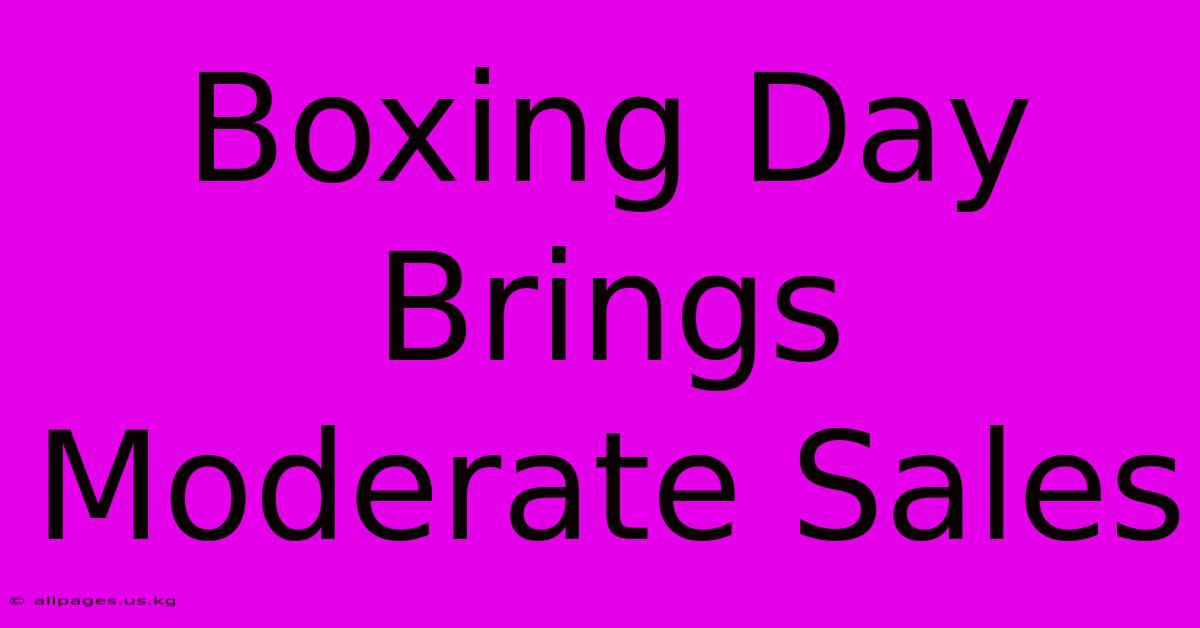Boxing Day Brings Moderate Sales

Discover more detailed and exciting information on our website. Click the link below to start your adventure: Visit Best Website allpages.us.kg. Don't miss out!
Table of Contents
Boxing Day Brings Moderate Sales: A Shift in Consumer Spending
Boxing Day, traditionally a day of massive post-Christmas sales and frenzied shopping, saw a more moderate turnout this year. While retailers still reported sales, the fervor of previous years seemed noticeably absent. This shift suggests a fascinating change in consumer behavior, influenced by several key factors.
A Dampened Festive Spirit?
Several contributing factors likely contributed to the quieter Boxing Day sales. The ongoing cost of living crisis undoubtedly played a significant role. With inflation impacting household budgets, consumers were more cautious with their spending, prioritizing essential items over non-essential purchases. This restraint is evident across various sectors, from electronics and clothing to home goods.
The Rise of Online Shopping and Early Bird Deals
The rise of online shopping continues to reshape the retail landscape. Many consumers opted for online deals in the weeks leading up to Christmas, taking advantage of early bird promotions and avoiding the crowds and potential hassle of in-person shopping on Boxing Day itself. This strategic shopping approach diffused the traditional Boxing Day rush, spreading sales activity over a longer period.
Changing Consumer Preferences
Beyond economic factors, consumer preferences are evolving. The emphasis on sustainable and ethical consumption is influencing purchasing decisions. Consumers are increasingly prioritizing quality over quantity, opting for fewer, more durable items rather than impulsive bargain purchases. This shift away from fast fashion and disposable goods directly impacts the volume of sales traditionally associated with Boxing Day.
The Impact on Retailers
The moderate sales figures on Boxing Day present both challenges and opportunities for retailers. While the immediate sales revenue might be lower compared to previous years, this also allows for a more sustainable approach to inventory management. Retailers can adjust their strategies, focusing on building stronger customer relationships through personalized offers and loyalty programs rather than solely relying on aggressive sales tactics.
Adapting to the New Normal
To thrive in this evolving market, retailers need to adapt their strategies to cater to the changing consumer landscape. This includes:
- Embracing Omnichannel Strategies: Seamless integration of online and offline shopping experiences is crucial.
- Focusing on Customer Loyalty: Building strong relationships with customers through personalized offers and excellent service is key.
- Prioritizing Sustainability: Consumers are increasingly seeking brands that align with their values, emphasizing ethical and sustainable practices.
- Data-Driven Decision Making: Analyzing consumer behavior and sales data to optimize inventory, pricing, and marketing strategies.
Looking Ahead: The Future of Boxing Day Sales
The moderate Boxing Day sales of this year are likely a sign of things to come. The cost of living crisis and changing consumer preferences will continue to influence shopping habits. Retailers need to proactively adapt and embrace these changes to remain competitive. The future of Boxing Day sales might not involve the frenzied rush of the past, but rather a more sustainable and thoughtful approach to shopping and commerce. It's a shift that necessitates a reevaluation of traditional retail models and a greater focus on building lasting customer relationships. The "bargain hunt" may be evolving into something more considered and long-term.

Thank you for visiting our website wich cover about Boxing Day Brings Moderate Sales. We hope the information provided has been useful to you. Feel free to contact us if you have any questions or need further assistance. See you next time and dont miss to bookmark.
Featured Posts
-
Red Wings Fire Lalonde Hire Mc Lellan
Dec 27, 2024
-
Wordle 1287 Clues For Friday
Dec 27, 2024
-
Chat Gpt Downtime Service Recovery
Dec 27, 2024
-
Salah This Years Title Feels
Dec 27, 2024
-
Todays Game Rutgers Vs Kansas State Score
Dec 27, 2024
